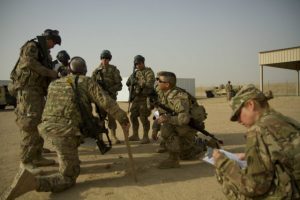
“All effective leaders are effective leader developers,” says Bernard Banks, retired Brigadier General of the US Army and now X at Kellogg School of Management. Banks noted that upon leaving military service after a 25-year career, he saw a disconnect between the military and the business world in the way they cultivated leaders. In business, developing leaders internally was a “perk” and not a strategic part of a long-term business plan. Additionally, companies did not invest appropriately in training future executives—or at planning for the future.
It’s trendy these days to offer military leadership concepts as lessons for the business world. After all, who does not want to equate themselves with being part of an operation for the greater good? However, there might be no true applicability for the methods of a Navy SEAL commander in the business world. Suggestions like “meticulous planning,” “ambush the competition,” “study Darwin,” make for interesting reading but perhaps do not work in business situations. An interesting piece on ted.com takes up this issue and shows how fundamental differences between the military world and the civilian one may make applicability tricky:
“…our very civilian lack of tradition, system and formal rank is important to remember — because it means that a failure of communication or process probably isn’t due to a deep flaw in a formal system, but is just two people with different ideas, a problem solved by talking, sometimes at length. It’s not acceptable in a battlespace, but in the perpetual pickup-basketball game that is modern work, it’s what we do…”
All that being said, I found Banks’s ideas thoughtful and not a “cut and paste” from military to business. His ideas include:
- Train leaders long before they get into leadership roles. Banks calls this intentional leadership, and it echoes the highly organized process to ascend through military ranks.
- Don’t cherry pick. In the military, everyone has the potential to be a great leader, given the training and situation. So don’t limit future leaders to a handful of “stars.” You may miss the real future CEO.
- Sink or swim. While the armed services does pride itself on training, teaching only goes so far. That’s when you are thrown into a situation forced to apply those lessons in real life.
- Don’t hold employees back. You will never be 100% prepared for anything. Giving them some autonomy and freedom to make decisions about their own readiness and their own trajectory will result in happier employees.
As with many business “lessons,” it takes a certain amount of nuance to translate practices into the real world—and Banks’s career in the military has some interesting lessons for all of us.





